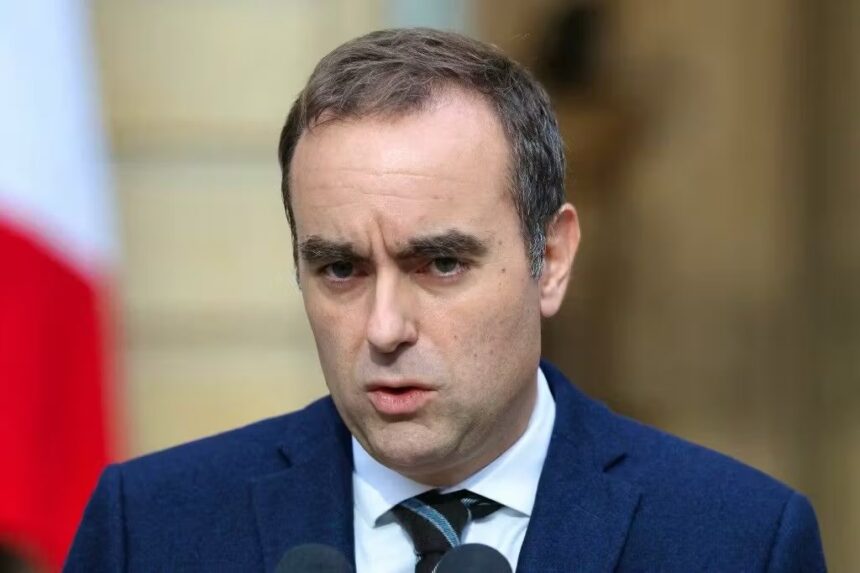French Prime Minister Sébastien Lecornu has announced his resignation on Monday, October 6, 2025, thrusting President of France, Emmanuel Macron into yet another round of government turmoil.
Lecornu’s resignation comes just 27 days after he was appointed as Prime Minister by Macron.
The departure, also announced hours after Lecornu unveiled his cabinet lineup, has ignited calls for Macron’s own resignation and deepened the nation’s political paralysis.
Pan-Atlantic Kompass reports that Lecornu, a 39-year-old Macron loyalist and former armed forces minister, tendered his government’s resignation to the Élysée Palace early Monday morning, citing insurmountable “partisan appetites” and a failure to forge compromises in a fractured National Assembly.
“The conditions were no longer met for me to perform the duties of prime minister,” he declared in a somber address from the steps of the Matignon residence, France’s prime ministerial headquarters.
This marks the shortest tenure for any head of government in modern French history, eclipsing even the brief stints of predecessors in Macron’s seven-year presidency.
“We didn’t need much to get there,” Lecornu said of negotiations with other parties to chart a path towards a workable government, adding that a lack of humility and “certain egos” got in the way. “There are lots of red lines in the mouths of some” but “there were rarely any green lines,” he added.
“You can’t be prime minister when the conditions simply aren’t there,” Lecornu said. “Political parties keep acting as if each of them held a majority in the National Assembly.”
Lecornu also criticised the “partisan appetites” of political factions.
“I was ready for compromise but all parties wanted the other party to adopt their programmes in their entirety,” he said.
“It wouldn’t need much for this to work,” he added, saying, however, that parties needed to be more humble and “to cast some egos aside”.
Macron on October 6, 2025 has accepted Prime Minister Sebastien Lecornu’s resignation, the presidency confirmed.
For Macron, Sébastien Lecornu’s resignation represents a setback. The development means Macron has appointed seven prime ministers since 2017, and the fifth in under two years amid a battle over the control of the country’s parliament.
It was gathered that Sébastien Lecornu resigned after a widespread backlash erupted against his freshly announced cabinet.
Critics lambasted the cabinet as a recycled ensemble of holdovers from the ousted administration of François Bayrou.
Key appointments, including the elevation of ex-Finance Minister Bruno Le Maire to defense chief, drew fire from across the spectrum.
Parties across the board in the National Assembly had fiercely criticised the composition of Lecornu’s cabinet, which was largely unchanged from Bayrou’s, and threatened to vote it down.
“Macron must now choose: dissolution or resignation, and fast! The only wise thing to do now is to hold elections,” said Marine Le Pen of the hard-right National Rally (RN).
“The joke’s gone on long enough. French people are fed up. Macron has put the country in an extremely difficult position,” she added.
In the opposition, many rushed to ask for Macron to call new snap parliamentary elections or resign.
Similarly, Mathilde Panot, of the hard left France Unbowed, said: “Sébastien Lecornu resigns. 3 Prime Ministers defeated in less than a year. The countdown has begun. Macron must go.”
David Lisnard, of the conservative Republicans, was also among those who called on Macron to leave.
The decision on how to proceed now rests with Macron, who must surely be asking himself how long this political charade can be allowed to go on.
He has three options. He can appoint another prime minister. He can once again dissolve the National Assembly. Or he can resign himself.
However, inside sources have revealed that Macron is less likely to resign and that he is likely to appoint another Prime Minister.
Recall that French politics has been highly unstable since July 2024, when Macron called for snap parliamentary elections in a bid to achieve a clear majority following a bruising loss for his party in the European Parliament vote.
Instead the elections resulted in a hung parliament divided into ideologically opposed factions deeply at odds with one another and unwilling to work together.
This has made it difficult for any prime minister to garner the necessary support to pass any bills.
Michel Barnier was appointed prime minister last September but was ousted within three months.
The government of his successor François Bayrou’s too was voted down after nine months after parliament refused to back his austerity budget, which aimed to slash government spending by €44bn ($51bn; £38bn).
France’s deficit reached 5.8% of its GDP in 2024 and its national debt is 114% of its GDP. That is the third-highest public debt in the eurozone after Greece and Italy, and equivalent to almost €50,000 per French citizen.
Stocks fell sharply on the Paris exchange after the news of Lecornu’s resignation broke on Monday morning.





